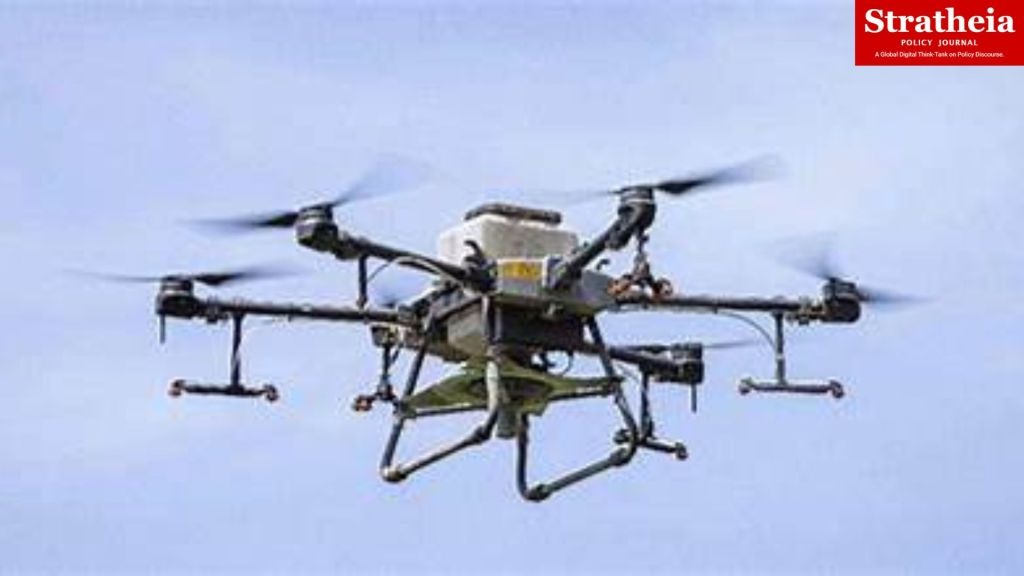India has started conducting its first ever a Cold Start drone and counter drone war exercise on 7th October 2025 to demonstrate the evolving posture of its conventional strike capability. The exercise is taking place at the military station on Babina (Uttar Pradesh) and Mhow (Madhya Pradesh). It is happening for the first time since the Operation Sindoor that India’s Army, Navy and Air Force joined together in an integrated drone and counter-drone exercise. It sends a strategic signal to Pakistan regarding India’s modernizing warfare strategy. This highlights that India is seeking alternative ways to engage Pakistan in the conventional domain. The shift from the terrestrial battlefield to airspace reflects India’s consistent approach to engage Pakistan under the nuclear overhang. This doctrinal transition in India’s warfare underscores the impact of Pakistan’s nuclear deterrence, which has compelled India to modify its approach to conventional war. The drill focuses on evaluating the efficacy and loopholes in the current air defense capabilities. It also aims at assessing the operational readiness against the evolving aerial attacks.
India’s Cold Start Doctrine (CSD) was first coined and adopted in 2004 against Pakistan. It aimed at shifting the conventional approach to war. It envisaged to utilize ground powers for several attacks, before the mobilization of Pakistan’s forces. The CSD was envisioned by the Indian military to cause irreparable damage to Pakistan without escalating to nuclear war. Pakistan swift respond with tactical warhead carrying missile such as Nasr as well as its robust aerial capability made the Indian CSD obsolete. This time, India has adopted the strategy of CSD in aerial domain by executing unmanned AI-integrated, drones, hypersonic tools and electronic warfare against Pakistan, without crossing the nuclear threshold.
The cold start drones and counter-drone exercise of the Indian military is the biggest ever drone centric military drills. It deeply evaluates the Indian drones and counter drone system with a purpose to strengthen the air defense system and counter-unmanned-aerial system (UAS). The tri-service military debut, embodies a significant evolution in the Indian’s warfare strategy. Industry partners, defense research wing, and academia, in addition to the armed forces, also partake in the drill. The “Cold Star signature” a military doctrine known for swift and limited operation against Pakistan, underlined swarm tactics, electronic warfare, and AI-collaborated drones. The exercise is anticipated to involve high-threat scenarios by projecting around 100 local and imported UAS platforms.
Chief of Integrated defense Staff (IDS), Air Marchal Ashutosh Dixit, stressed that India’s future military doctrine is engrained in the vision of an integrated and layered defense system, the Sudarshan Chakra. Moreover, he reflected that anti-drone system will counter military targets as well as the criminal activities. The Sudarshan Chakra doctrine refers to the capability of countering drones, UAVs, space-based threats, and hypersonic missiles. It pursues to establish Air Defense System which is aimed at strengthening India’s deterrence and offensive capabilities. This system will be the part of Multi-Layered Missile Defense System.
The mission Sudarshan Chakra was launched by the PM Modi during the event of India’s 79th Independence Day. The Cold Start drone exercise is modeled on this evolving concept of modernized, tech-laden military combat system seeking to offend and defend against an enemy target with an unmanned artillery system. Cold Start upholds a transition from manpower military concepts to techno-laden ones, resonating global trends but is not tailored to South Asia’s volatile security calculus, considering the delicate nuclear threshold. Drones or UAVs cannot change the calculus of limited wars, in case of South Asia, for a strong reason.
Whether India attacks Pakistan with terrestrial armored and artillery system, drone swarms, AI-integrated UASs, or electronic warfare, the escalation to nuclear war will still be determined by the scale of damage it inflicts on Pakistan. Pakistan’s first use nuclear policy is guided by the extent of damages caused by the enemy’s conventional attack. The mode of warfare does not modify or expand the nuclear threshold. India overlooks the reality that the nuclear threshold in South Asia cannot be shaped by the evolving military posture in pursuit of limited gain. Instead, it will generate crisis instability and miscalculation. India’s continuous revision of its warfare doctrine, from the Sunderji, to Cold Start, and now to the Doctrine of Rapid and Short (DRS), reflects the efficacy of Pakistan full spectrum deterrence (FSD). India’s cold start drones and counter drone preparedness, illustrates its design to gain dominance across domains, bolstered by precision and ambiguity. General Anil Chauhan, India’s Chief of Defense Staff (CSD), confidently adopted that Operation Sindoor had “created space” for conventional war under the nuclear threshold. India’s military buildup demonstrates its readiness for another misadventure against Pakistan. However, if India convinces itself that nuclear weapons can be overlooked while playing limited war games, then South Asia would become the most possible flashpoint for the first nuclear war in the 21st century. Pakistan’s doctrine of FSD is precisely framed to deter conventional as well as non-conventional attacks. Pakistan nuclear card will always be in play, whether Pakistan responds conventionally, or asymmetrically. Considering India’s illusionary strategic behavior, the future is riskier than before. Operation Sindoor proved the fact that how quickly a crisis between India and Pakistan can escalate to nuclear exchange, despite proving the possibility of limited war.
This article was published in another form at https://stratheia.com/indias-cold-start-doctrine-terrestrial-to-aerial-domain/
Mr Murad Ali is a Research Officer at Center for International Strategic Studies (CISS), Islamabad

